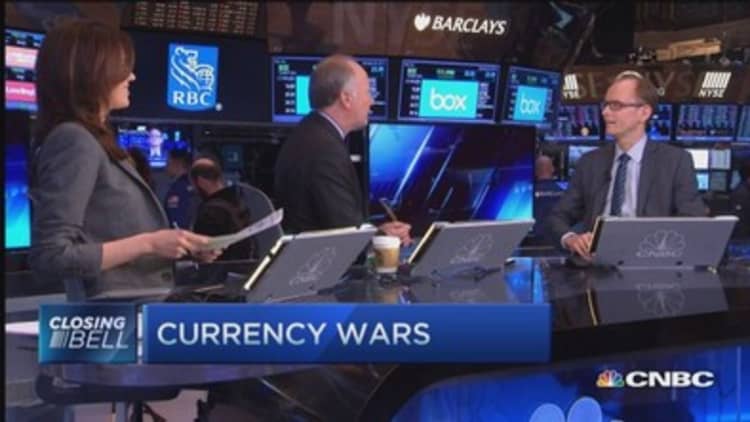
The euro dropped lower on Friday in the wake of the European Central Bank announcing fresh stimulus measures, hitting 11-year lows against the dollar.
Forces including a strengthening United States economy will push the euro to parity with the dollar by the end of next year as euro zone countries look to break through a period of sluggish growth, an economist said on Friday.
"The problems in Europe are not going away, just in the near-term. You have the U.S. doing better, and Europe continuously being behind. That will continue to put downward pressure on the euro for quite some time," Torsten Slok, chief international economist at Deutsche Bank, told CNBC's "Closing Bell."
The euro lingered around $1.12 against the dollar on Friday afternoon. The currency will slip even more, possibly below the dollar, providing a short-term boost to the U.S. economy, said Jack McIntyre, portfolio manager at Brandywine Global, told "Closing Bell."
Read MoreCurrency expert: Euro going 'well below parity'
McIntyre argued that the ECB's move will push capital from Europe to the United States. Among other effects, it will make U.S. Treasury yields more appealing than those on comparable German bonds, which sit remarkably low in one of the euro zone's most stable areas.
'Ultimately, that's going to be a net positive for the U.S. economy because I think it's going to flow through and have a positive impact on housing at some point in 2015," McIntyre said.
Read MoreCurrency war: Who will be the casualties?
McIntyre added that a weaker dollar has helped the U.S. recover in recent years in the Federal Reserve's low-interest rate environment. But in the long term, as the dollar continues to strengthen, low interest rates and strong currencies "don't work," he said.


